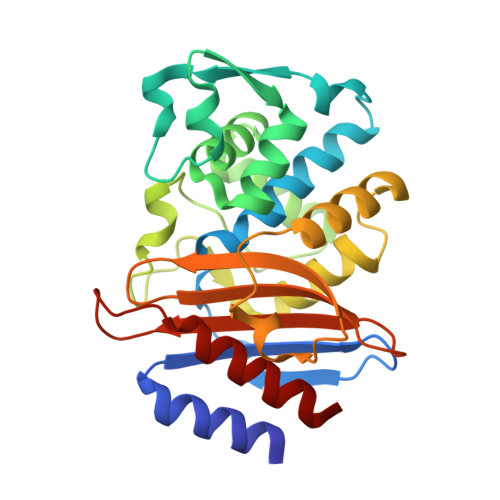Structure-Based Design of Potent and Ligand-Efficient Inhibitors of CTX-M Class A Beta-Lactamase
Nichols, D.A., Jaishankar, P., Larson, W., Smith, E., Liu, G., Beyrouthy, R., Bonnet, R., Renslo, A.R., Chen, Y.(2012) J Med Chem 55: 2163-2172
- PubMed: 22296601
- DOI: https://doi.org/10.1021/jm2014138
- Primary Citation of Related Structures:
4DDS, 4DDY, 4DE0, 4DE1, 4DE2, 4DE3 - PubMed Abstract:
The emergence of CTX-M class A extended-spectrum β-lactamases poses a serious health threat to the public. We have applied structure-based design to improve the potency of a novel noncovalent tetrazole-containing CTX-M inhibitor (K(i) = 21 μM) more than 200-fold via structural modifications targeting two binding hot spots, a hydrophobic shelf formed by Pro167 and a polar site anchored by Asp240. Functional groups contacting each binding hot spot independently in initial designs were later combined to produce analogues with submicromolar potencies, including 6-trifluoromethyl-3H-benzoimidazole-4-carboxylic acid [3-(1H-tetrazol-5-yl)-phenyl]-amide, which had a K(i) value of 89 nM and reduced the MIC of cefotaxime by 64-fold in CTX-M-9 expressing Escherichia coli . The in vitro potency gains were accompanied by improvements in ligand efficiency (from 0.30 to 0.39) and LipE (from 1.37 to 3.86). These new analogues represent the first nM-affinity noncovalent inhibitors of a class A β-lactamase. Their complex crystal structures provide valuable information about ligand binding for future inhibitor design.
Organizational Affiliation:
University of South Florida College of Medicine, Department of Molecular Medicine, 12901 Bruce B. Downs Boulevard, MDC 3522, Tampa, Florida 33612, USA.

















